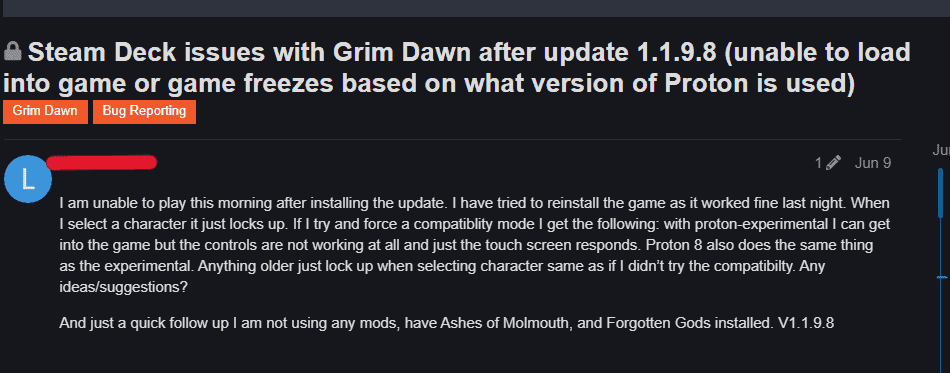Experiencing stuttering and freezing issues can be incredibly frustrating when you’re trying to enjoy Grim Dawn on your Steam Deck.
These performance hiccups can pull you right out of the immersive world of Cairn, turning a fun gaming session into a troubleshooting headache.
But don’t worry, you’re not alone in this. Many players have reported similar problems, especially after certain updates.
In this blog, we’ll explore some tried-and-true methods to get your game running smoothly again.
From simple restarts to more in-depth technical fixes, we’ll guide you through the steps you can take to banish those performance gremlins for good.
So, if you’re ready to get back to slaying beasts and looting dungeons without interruption.

How To Fix Grim Dawn Steam Deck Stuttering & Freezing Issues
This error Grim Dawn Steam Deck Stuttering and freezing Issues can be fixed by restarting the steam deck, updating the Grim Dawn, Check proton Versions, adjusting the game-in settings, and running as an administrator.
1. Restart Your Steam Deck
Sometimes, the simplest solution can be the most effective. Turn off your Steam Deck, wait a few minutes, then turn it back on. This can clear temporary glitches that may be causing performance issues.
- Hold down the power button on the top of your Steam Deck until the power menu appears.
- Select “Turn Off” to shut down the device.
- Wait for a couple of minutes.
- Press the power button again to turn the Steam Deck back on.
2. Update Grim Dawn and Steam Deck Software
Ensure that both your game and Steam Deck are running on the latest updates. Developers often release patches to fix bugs and improve performance.
- For Grim Dawn, open the Steam client, go to your Library, right-click on Grim Dawn, and select “Properties.” Under the “Updates” tab, ensure that automatic updates are enabled.
- To update your Steam Deck, go to the Settings menu, select “System,” and then “Check for Updates.” If an update is available, follow the prompts to install it.
3. Check Proton Versions
Grim Dawn relies on the Proton compatibility layer to run on Steam Deck. Some users have found that changing the version of Proton can resolve loading and freezing issues. Experiment with different versions to see which one offers the best performance with Grim Dawn.
- In your Steam Library, right-click on Grim Dawn and select “Properties.”
- Click on the “Compatibility” tab.
- Check the box that says “Force the use of a specific Steam Play compatibility tool.”
- Select a different version of Proton from the dropdown menu.
- Restart the game to see if performance improves.
4. Adjust In-Game Settings
Lowering the graphics settings within Grim Dawn can help reduce stuttering. Try reducing the resolution, turning off Vsync, or lowering other graphical settings to see if it improves your gameplay.
- Launch Grim Dawn and go to the game’s settings menu.
- Navigate to the “Video” or “Graphics” settings.
- Lower the resolution, disable Vsync, and reduce texture quality or other settings that may demand a lot of resources.
- Apply the changes and restart the game to test for improvements.
5. Manage Steam Cloud Settings
If you’re using Steam Cloud, try disabling it temporarily to see if it improves performance. Some players have found that this can reduce stuttering issues.
- In your Steam Library, right-click on Grim Dawn and select “Properties.”
- Go to the “General” tab.
- Uncheck the box next to “Keep games saves in the Steam Cloud for Grim Dawn.”
- Close the properties window and restart the game.
6. Update Graphics Drivers
Make sure that your Steam Deck’s graphics drivers are up to date. Outdated drivers can cause performance issues in games.
- Visit the website of your graphics card manufacturer (e.g., NVIDIA, AMD, Intel).
- Find the driver download section and select your graphics card model.
- Download the latest driver and install it following the manufacturer’s instructions.
7. Run the Game as an Administrator
Running Grim Dawn with administrative privileges can sometimes improve its interaction with system resources and reduce stuttering.

